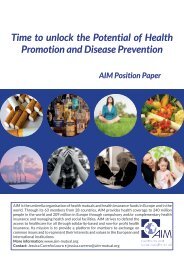Exploring patient participation in reducing health-care-related safety risks
Exploring patient participation in reducing health-care-related safety risks
Exploring patient participation in reducing health-care-related safety risks
You also want an ePaper? Increase the reach of your titles
YUMPU automatically turns print PDFs into web optimized ePapers that Google loves.
<strong>Explor<strong>in</strong>g</strong> <strong>patient</strong> <strong>participation</strong> <strong>in</strong> reduc<strong>in</strong>g <strong>health</strong>-<strong>care</strong>-<strong>related</strong> <strong>safety</strong> <strong>risks</strong><br />
128<br />
rehabilitation. Results of CQI surveys are used for public report<strong>in</strong>g, provid<strong>in</strong>g consumer<br />
<strong>in</strong>formation and improv<strong>in</strong>g the quality of <strong>care</strong>, among other th<strong>in</strong>gs.<br />
The Centre for Consumer Experience <strong>in</strong> Health Care has an onl<strong>in</strong>e database of all<br />
the <strong>in</strong>dividual items <strong>in</strong> CQI questionnaires that was used to identify questions about<br />
experiences with <strong>patient</strong> <strong>safety</strong>, adverse events, trust, and so on. After identify<strong>in</strong>g<br />
these questions and their location (with<strong>in</strong>, for example, a specific CQI questionnaire),<br />
publications were searched to f<strong>in</strong>d empirical data collected with the questionnaires. This<br />
resulted <strong>in</strong> the f<strong>in</strong>d<strong>in</strong>gs reported <strong>in</strong> the sections below.<br />
Adverse events<br />
Sixteen per cent of Netherlander breast cancer <strong>patient</strong>s reported that they had<br />
experienced <strong>in</strong>fections after their surgery (69). Six per cent of those who had total-hip<br />
or total-knee replacement reported that they needed a second operation because of a<br />
complication or <strong>in</strong>fection.<br />
Three per cent of cataract <strong>patient</strong>s reported that they had been reoperated on with<strong>in</strong><br />
three weeks (70) and 13% reported that they experienced complications (71).<br />
Safety management<br />
Twenty-three per cent of cataract <strong>patient</strong>s reported that they were not told what to do <strong>in</strong><br />
case of emergency; 46% reported that hospital personnel did not ask them if they were<br />
allergic to iod<strong>in</strong>e; and 40% said that hospital personnel did not ask them if they were<br />
allergic to any other drug (71).<br />
Twenty-n<strong>in</strong>e per cent of hospital <strong>patient</strong>s reported that their identity was “never” or<br />
only “sometimes” checked before they were given their medication, and 13% that their<br />
identity was “never” or “sometimes” checked before a procedure was performed (72)<br />
(Fig. 7.1).<br />
Fig . 7 .1 . Patient experiences with <strong>safety</strong> management – <strong>in</strong><strong>patient</strong> hospital <strong>care</strong> <strong>in</strong> the<br />
Netherlands, 2009<br />
Was your identity checked before<br />
a procedure took place? N=19 536<br />
Was your identity checked before you<br />
were given your medication? N=15 941<br />
Did hospital personnel pay attention<br />
to unsafe situations? N=21 879<br />
Did hospital personnel pay attention to<br />
the prevention of accidents? N=22 874<br />
Did you have the feel<strong>in</strong>g that you were<br />
<strong>in</strong> good hands with doctors, nurses<br />
or other professionals? N=23 861<br />
%<br />
0 20 40 60 80 100<br />
Note: results from 94 hospitals.<br />
Source: Miletus (72).<br />
Never/sometimes<br />
Usually<br />
Always



